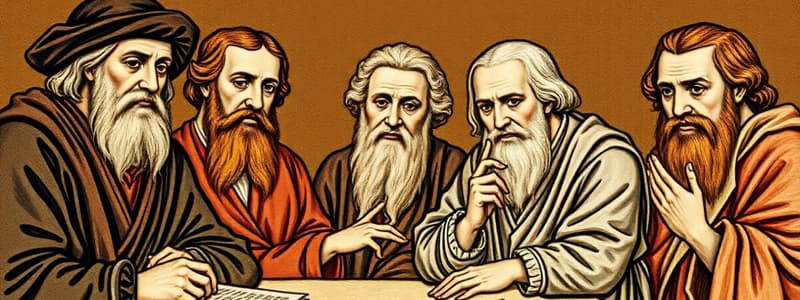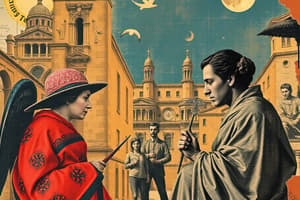Podcast
Questions and Answers
Which of the following statements accurately defines the role of a philosopher during the Renaissance?
Which of the following statements accurately defines the role of a philosopher during the Renaissance?
- Philosophers focused solely on religious teachings.
- Philosophers were involved in translating and preserving classical texts. (correct)
- Philosophers only wrote poetry.
- Philosophers were primarily patrons of the arts.
What belief distinguished Francesco Petrarca's views on ancient societies?
What belief distinguished Francesco Petrarca's views on ancient societies?
- He believed ancient societies were superior to European society. (correct)
- He believed they were less advanced than contemporary European society.
- He promoted the idea that society should reject ancient texts.
- He thought ancient societies should be ignored.
Which of the following contributions is deservingly attributed to Desiderius Erasmus?
Which of the following contributions is deservingly attributed to Desiderius Erasmus?
- Writing 'The Praise of Folly' to criticize clergy corruption. (correct)
- Teaching ancient languages at the Collegium Trilingue.
- Translating the Bible into Latin.
- Inventing the essay as a literary form.
What major idea did Michel de Montaigne promote through his works?
What major idea did Michel de Montaigne promote through his works?
Which action is correctly associated with Guillaume Budé?
Which action is correctly associated with Guillaume Budé?
What does the term 'Humanism' refer to in the context of the Renaissance?
What does the term 'Humanism' refer to in the context of the Renaissance?
How did the views of the Middle Ages Christianity differ from Renaissance Humanism regarding life?
How did the views of the Middle Ages Christianity differ from Renaissance Humanism regarding life?
What was Lorenzo Valla known for in his criticisms of the past?
What was Lorenzo Valla known for in his criticisms of the past?
What was one significant outcome of Martin Luther's actions during the Protestant Reformation?
What was one significant outcome of Martin Luther's actions during the Protestant Reformation?
Which city is recognized as the birthplace of the Renaissance?
Which city is recognized as the birthplace of the Renaissance?
What was one role of the Medicis in Florence?
What was one role of the Medicis in Florence?
Which explorer is known for landing in the Bahamas in 1492?
Which explorer is known for landing in the Bahamas in 1492?
What was one of the main motivations behind European expansionism during the Age of Exploration?
What was one of the main motivations behind European expansionism during the Age of Exploration?
What was one consequence of the criticism of the Christian Church during the early 1500s?
What was one consequence of the criticism of the Christian Church during the early 1500s?
What economic transformation took place in Portugal during the Age of Exploration?
What economic transformation took place in Portugal during the Age of Exploration?
What defines colonialism as described in the content?
What defines colonialism as described in the content?
Flashcards
Renaissance Philosopher
Renaissance Philosopher
A person during the Renaissance who studied ideas about knowledge, truth, and the meaning of life; they often translated ancient works, wrote, and taught.
Humanism
Humanism
A Renaissance belief system focused on human values, abilities, and worth; valuing classical Greek and Roman ideas.
Petrarch
Petrarch
A Renaissance philosopher known for translating ancient Greek texts and supporting humanist ideas.
Erasmus
Erasmus
Signup and view all the flashcards
Budé
Budé
Signup and view all the flashcards
Montaigne
Montaigne
Signup and view all the flashcards
Valla
Valla
Signup and view all the flashcards
Patron
Patron
Signup and view all the flashcards
Protestant Reformation
Protestant Reformation
Signup and view all the flashcards
Age of Exploration
Age of Exploration
Signup and view all the flashcards
Imperialism
Imperialism
Signup and view all the flashcards
Expansionism
Expansionism
Signup and view all the flashcards
Colonialism
Colonialism
Signup and view all the flashcards
Martin Luther
Martin Luther
Signup and view all the flashcards
Christopher Columbus
Christopher Columbus
Signup and view all the flashcards
Study Notes
Renaissance Philosophers
- Philosopher Definition: Someone who studies knowledge, truth, and life's meaning.
- Philosopher Roles: Translated classical works, wrote essays/poems/books, taught youth, presented ideas.
- Francesco Petrarch (Petrarch): Translated ancient Greek texts, traveled Italian city-states, believed ancient societies superior to his time, believed in combining Christian and humanist ideas.
- Desiderius Erasmus: Translated the Bible to vernacular languages, wrote "The Praise of Folly" critiquing clergy, believed study involves discussion over memorization, and emphasized Bible & classics.
- Guillaume Budé: Filled French National Library with ancient manuscripts, founded Collegium Trilingue (Greek, Latin, Hebrew), spread Renaissance to Northern Europe, favored original language study, believed laws should be logical and reason-based, and kings should support the arts.
- Michel de Montaigne: Invented the essay style, advocated for educational reform, promoted skepticism (challenging knowledge claims), and believed openness improves learning.
- Lorenzo Valla: Exposed the Donation of Constantine forgery, compared biblical translations, challenged Scholastic-Aristotelian views, used a linguistic approach.
Humanism
- Definition: A Renaissance cultural movement emphasizing classical Greek/Roman values (reason, justice, ethics).
- Focus: Humans, their values, abilities, and individual worth; humanists believed individuals could improve the world.
Middle Ages Christianity vs. Renaissance Humanism
- Middle Ages Christianity: Emphasized survival over beauty.
- Renaissance Humanism: Prioritized experiencing human potential and fulfillment.
Patrons
- Definition: Individuals providing financial and other support to people, organizations, or causes.
Benevolence
- Definition: Desire to do good for others, goodwill, kindness.
Italian City-States
- Genoa: Important seaport (natural harbor), birthplace of Columbus, traded heavily. Byzantine Empire was part of their trading route. Marco Polo imported goods to Italy.
- Venice: Powerful trading power, considered "queen".
- Florence: Renaissance birth place and center of wool trade, used gold coin currency used widely. The Medici family were significant patrons.
Protestant Reformation (Martin Luther)
- Time Period: 16th century.
- Event: Religious revolution against the Church.
- Criticisms: Corruption perceived within the Church.
- Indulgences: Selling forgiveness for sins.
- 95 Theses: Luther's criticisms, nailed to a church door in 1517.
- Outcome: Church executed him in 1521, expanded access to the Bible (translated from Latin).
Age of Exploration
- Alternative Names: Age of Discovery, maritime trade expansion
- Motivation: Capitalizing on sea trade, new technology and exploration driven by need (necessity).
- Key Figures: Prince Henry, Portuguese explorers (greatest technological strides), Christopher Columbus, Cabot, Cartier.
- Techniques: Portuguese used cannons for small-forces battles, explored Indian Ocean (first).
- Result: Portugal's rise from poor to rich nation.
European Expansionism
- Explorers: Bartholomew Dias, Columbus, Giovanni Caboto, and Jacques Cartier are key figures.
- Techniques: Portuguese used cannons for military advantage
- Portugal: First European country to organize exploration
- Impact: Exploration by Portuguese fleets extended to the Indian Ocean.
Imperialism, Expansionism, and Colonialism
- Imperialism: Conquest & domination through economic, political, and social control.
- Motivations: The 3 Gs: God, Gold, and Glory.
- Expansionism: Expanding territories and power.
- Colonialism: Policy of creating and maintaining colonies.
Studying That Suits You
Use AI to generate personalized quizzes and flashcards to suit your learning preferences.




